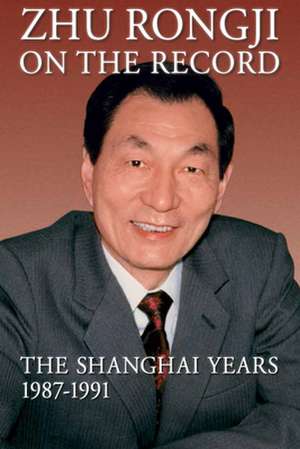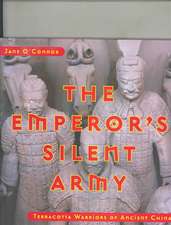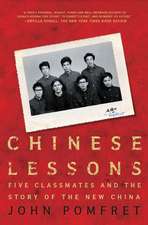Zhu Rongji on the Record
Autor Rongji Zhuen Limba Engleză Hardback – 6 feb 2018
| Toate formatele și edițiile | Preț | Express |
|---|---|---|
| Paperback (2) | 316.45 lei 6-8 săpt. | |
| Brookings Institution Press – 16 aug 2013 | 316.45 lei 6-8 săpt. | |
| Brookings Institution Press – 8 ian 2015 | 380.91 lei 6-8 săpt. |
Preț: 399.25 lei
Nou
Puncte Express: 599
Preț estimativ în valută:
76.40€ • 83.24$ • 64.38£
76.40€ • 83.24$ • 64.38£
Carte indisponibilă temporar
Doresc să fiu notificat când acest titlu va fi disponibil:
Se trimite...
Preluare comenzi: 021 569.72.76
Specificații
ISBN-13: 9780815731399
ISBN-10: 0815731396
Pagini: 656
Dimensiuni: 163 x 231 x 48 mm
Greutate: 1.2 kg
Editura: Rowman & Littlefield Publishers, Inc.
ISBN-10: 0815731396
Pagini: 656
Dimensiuni: 163 x 231 x 48 mm
Greutate: 1.2 kg
Editura: Rowman & Littlefield Publishers, Inc.
Notă biografică
Zhu Rongji served as mayor of Shanghai from 1987 to 1991, was China's vice premier from 1991 to 1998, and served as fifth premier of the People's Republic from 1998 to 2003. Between 1993 and1995 he served concurrently as governor of the People's Bank of China.
Henry A. Kissinger was U.S. secretary of state from 1973 to 1977.
Helmut Schmidt was chancellor of West Germany from 1974 to 1982.
Henry A. Kissinger was U.S. secretary of state from 1973 to 1977.
Helmut Schmidt was chancellor of West Germany from 1974 to 1982.
Descriere
Descriere de la o altă ediție sau format:
China's explosive transformation from a planned economy to a more market-oriented one over the past three decades owes much to the charismatic reformer Zhu Rongji. His pragmatism and strong work ethic have been key forces in China's drive to greater modernization and global stature. He served as the mayor and party chief in Shanghai from 1987 to 1991, as vice premier of China from 1991 to 1998, and then as premier until 2003. This monumental collection brings together, for the first time in English, over one hundred important speeches, articles, letters, and instructions written during his term as vice premier, when he had major responsibility for fulfilling Deng Xiaoping's vision and setting China on a new and fruitful course.
During this time, Zhu embarked on a plan to reduce the size of government and reform the heavily indebted banking system and state-owned enterprises as well as the housing and health care systems. His sweeping efforts ranged from lobbying for the establishment of stock exchanges to revitalizing agriculture through the introduction of a modern grain market. The ramifications of these reforms are still being felt throughout China and the globe, and Zhu Rongji on the Record provides a real-time look at these plans as they were being formulated during the 1990s.
These pages also reflect the forthright personality that gained great popularity with the Chinese public. Zhu vows to speak the truth and avoid "empty talk," as he tells his compatriots. "We must tackle [reform] with both hands, and both hands must be strong." To this end, he provides lists of "musts" and "mustn'ts" that will ensure a "soft landing" during China's transition and calls for swift and resolute action, both in reform and in fighting corruption.
In addition to revealing the evolution of Zhu's thinking and demonstrating how he helped transform the world's most populous nation, this book provides insight into the course of China's economic refor
During this time, Zhu embarked on a plan to reduce the size of government and reform the heavily indebted banking system and state-owned enterprises as well as the housing and health care systems. His sweeping efforts ranged from lobbying for the establishment of stock exchanges to revitalizing agriculture through the introduction of a modern grain market. The ramifications of these reforms are still being felt throughout China and the globe, and Zhu Rongji on the Record provides a real-time look at these plans as they were being formulated during the 1990s.
These pages also reflect the forthright personality that gained great popularity with the Chinese public. Zhu vows to speak the truth and avoid "empty talk," as he tells his compatriots. "We must tackle [reform] with both hands, and both hands must be strong." To this end, he provides lists of "musts" and "mustn'ts" that will ensure a "soft landing" during China's transition and calls for swift and resolute action, both in reform and in fighting corruption.
In addition to revealing the evolution of Zhu's thinking and demonstrating how he helped transform the world's most populous nation, this book provides insight into the course of China's economic refor












